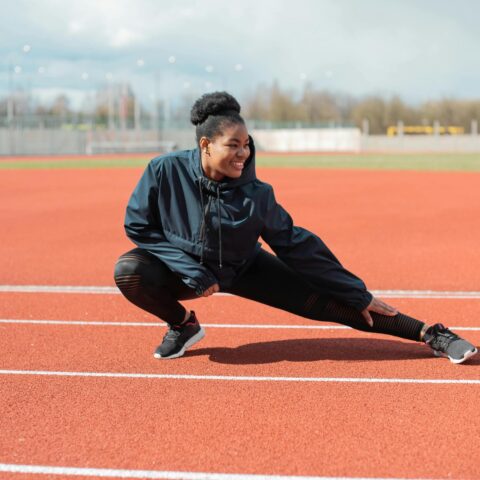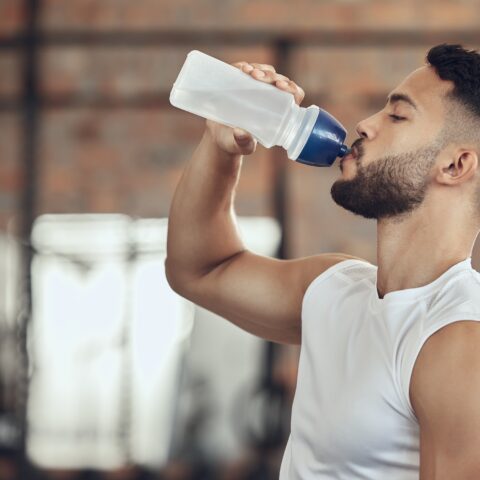Does Sexual Activity Affect Athletic Performance?

It is an age-old debate. Is it detrimental? Could it possibly enhance performance? Does it affect athletic performance at all?
In 1986, as a graduate student at Colorado State University under the guidance of my advisor and creator of The Paleo Diet, Dr. Loren Cordain, I decided to tackle how sexual activity affects athletic performance for my master’s thesis.
As I reviewed the research literature, I found there was little scientific data to support a conclusion either way. There were, however, many opinions based on myths and folklore.
Take, for example, the following excerpt from my thesis, which speaks to some of those myths:
Many opinions are based on myths started at least as far back as the Greek philosophers who believed that semen originated in the brain and that “excessive ejaculation” would injure the central nervous system and thus impair senses. [1]
In the early 1900s, the Doctrine of Conservation stated that a person has a finite amount of sexual energy and excessive orgasm is a reckless squandering of “vital fluids” that will leave one debilitated and a nervous wreck. [1]
With all due respect to folklore, these passages did not seem so conclusive as to warrant the rules and restrictions imposed on athletes then and now.
Yet, sports performance is often accompanied by financial incentives for winning. Thus, if there is any possibility of a negative impact, coaches and team management err on the side of caution, often instituting “no sexual activity” policies before competition. [3] But what if it has a positive effect?
As I determined for my thesis, in their research, Masters and Johnson, [4] concluded the contrary: “athletes should be able to perform at maximum ability after copulation if they are allowed a sufficient recuperation period, 1 to 5 minutes.”
It is also important to make the distinction between sexual intercourse or the factors which may accompany it, in regard to performance. The American Medical Association issued a statement that helps put the issue into proper perspective. They felt sexual intercourse the night before a game would make no difference in the performance of a married man or any man if intercourse is a regular part of his life. In fact, if it would help him release some tension and make him sleep better, it should be considered a slight benefit. [5]
In 1982, the coach of the 49ers football team allowed the married players to sleep with their wives before the Super Bowl game, abandoning the notion long cherished by coaches that sexual activity would drain an athlete’s strength. [1] The 49ers won the Super Bowl that year.
The Issue with Defining “Sex” and “Performance”
In 1968, W.R. Johnson conducted one of the few scientific experiments looking specifically at the effects of sex on performance. He tested grip strength in the morning following coitus and after a period of abstinence. It showed no difference in grip strength and grip endurance in the two conditions.
Johnson’s study concluded that the palmer flexors of the hand were not adversely affected by sexual activity occurring the previous night. [6]
Now, grip strength is important in many sports, but the palmer flexors aren’t usually the main muscle groups used for the majority of athletic events. Additionally, the palmer flexors aren’t exactly the main muscles involved in what we would consider traditional sexual intercourse.
It becomes clear that there are many factors involved in having sex and that there are a variety of definitions for “athletic performance.”
This illustrates the challenge in researching this topic, and also explains why there is little data and research—isolating the effects of the sexual act on athletic performance is difficult. Sometimes, sex is accompanied by late nights, carousing for partners, alcohol and other drugs, little sleep, and/or emotions—all of which can affect performance the next day. It may also depend on the length, amount, and intensity of the sexual activity as well as the type of athletic sport or performance.
These are some of the questions that had to be addressed when we were designing my thesis study. And since this was unfunded graduate research, I did not have an abundance of resources to work with, but Dr. Cordain and I did our best to design the study to address as many of the factors as possible.
We chose the specific topic: “Effects of Sexual Activity on Performance of Physical Capacity Tests in Young, Fit Males.” There were, at the time, three basic opinions on the topic that I summarized in the introduction:
Amidst the controversy, there seems to be three basic opinions that have surfaced: sexual activity is detrimental to athletic performance, sexual activity enhances athletic performance, and sexual activity has no effect on athletic performance. This lack of consensus is the result of a paucity of research in the area, most likely due to the sensitive nature of the subject and the difficulty in controlling the variables (Anshel, 1981). Consequently, people have relied on myths and hearsay to develop their own opinions.
We chose to test six measures of athletic performance: maximal grip strength, balance, agility, reaction time, lower extremity anaerobic power, and maximal oxygen uptake (AKA aerobic capacity).
To help us isolate sexual activity from other factors, we chose to use just men who were either married or cohabitating with one woman. These men were athletically fit and exercised three to five times per week.
We made further definitions and certain assumptions to attempt to isolate the act of sexual activity. These definitions, for the purposes of this study, were that sexual activity included intercourse, masturbation, petting, or any other activity that led to orgasm. (Abstinence was defined as the absence of these activities for a period of five days prior to testing.)
The goal of the study was to examine the effect of sexual activity on various measures of physical performance in healthy, fit male subjects. In agreement with our initial hypothesis, the study concluded that sexual activity the night before physical exercise showed no significant negative or positive difference in the performance of physical fitness measures.
The Notoriety of the Study
After I graduated, our study garnered a bit of notoriety and was even featured in Parade magazine in the Sunday paper, Health magazine, and other publications. Dr. Cordain was interviewed about it as well, and it became known at CSU as “The Sex Study” (which was second in notoriety only to “The Poop Study,” also conducted under Dr. Cordain’s watch). But the story continues.
After 32 years, I was contacted by a researcher in Atlanta, Gerald Zavorsky, who was doing a meta study on the topic. As it turns out, our research was still one of the few studies conducted on the topic. He asked if I still had my original statistical data, which I did, and if I would be interested in working with him to write an article for publication to add credibility to his study. I considered it a long shot, but was happy to help.
In July of 2019, the Journal of Sports Medicine and Physical Fitness published the article on our research from 1987. No one was more surprised than Dr. Cordain, who said this was a first for him.
References
- Saxton, L. The individual, marriage and the family. Wadsworth Publishing 1984
- Newton, W.L. Effects of sexual activity on performance of physical capacity tests in young fit males. Masters Thesis, Colorado State University, 1987
- Zavorsky, G.S. and Newton-Farrell, W.L. Effects of sexual activity on several measures of physical performance in young adult males. Journal of Sports Medicine and Physical Fitness 2019;59:1102-8
- Masters, W. and Johnson, V. The sexual response cycle. Little, Brown and Co Publishing 1966
- Cooper, D.L. Can scoring influence athletic performance? Sex and the athlete. Journal of the American College Health Association 1975;23:197-9
- Johnson, W.R. Muscular performance following coitus. Journal of Sex Research 1968;4:247-8




